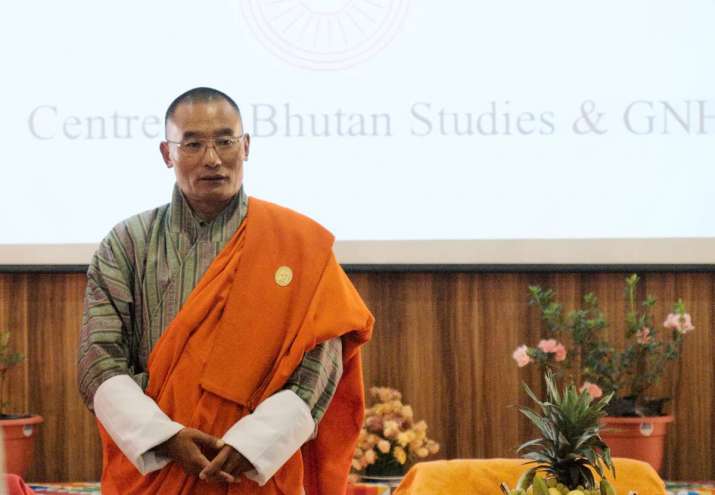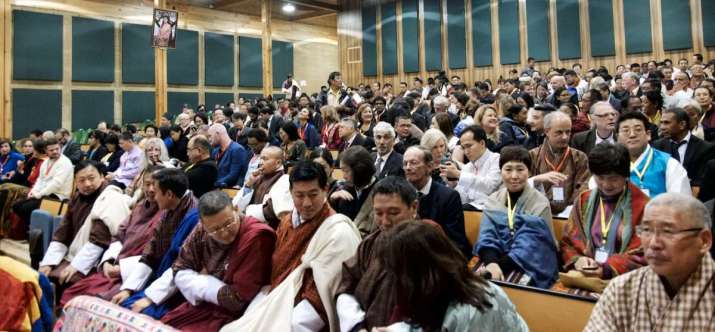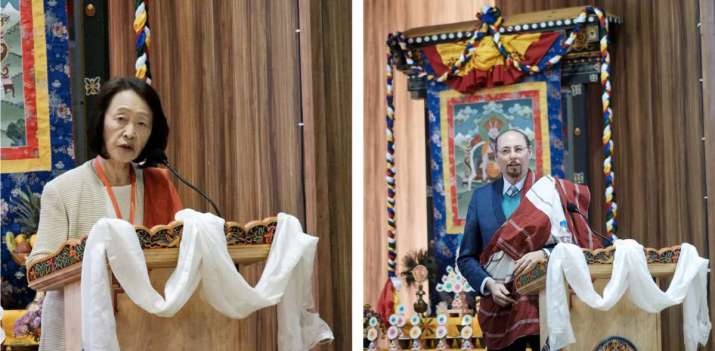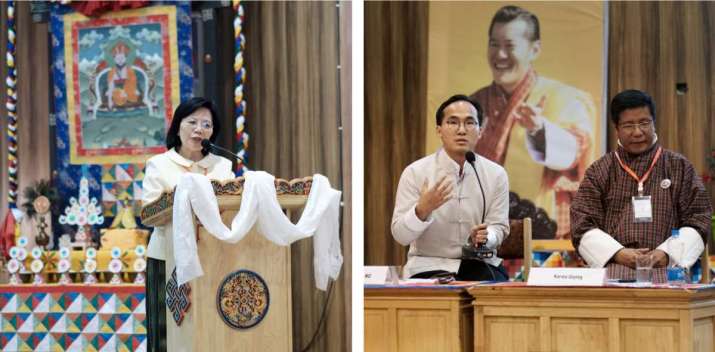NEWS
Bhutan Proposes a Buddhist Approach to Business at 7th International Conference on Gross National Happiness
 Bhutanese prime minister Dasho Tshering Tobgay proposes a Buddhism-inspired model for sustainable corporate development. Photo by Craig Lewis
Bhutanese prime minister Dasho Tshering Tobgay proposes a Buddhism-inspired model for sustainable corporate development. Photo by Craig LewisTHIMPHU—Aiming to draw up a new, sustainable paradigm for business and entrepreneurship founded on Buddhist values and principles and driven by compassion, the Kingdom of Bhutan this week launched the 7th International Conference on Gross National Happiness in the capital Thimphu, under the theme “GNH of Business.” More than 400 guests and dignitaries assembled for the forum, including almost 200 academics, entrepreneurs, and experts from 29 countries, to share ideas, approaches, and experiences of social and environmental responsibility in the corporate context from across the globe.
As the world faces the growing impact of manmade climate change, environmental degradation, pollution, and the human impact on the ecosystem and animal populations—all in the name of unchecked material consumption—the seminar acknowledged that traditional approaches to corporate social responsibility are inadequate to offset the negative impacts of commercial activity, and pointed to an urgent need for a radical transformation of attitudes, perspectives, and practices at the corporate level.
 Guests, speakers, and dignitaries from Bhutan and around the world gather to share their research, experiences, and proposals. Photo by Craig Lewis
Guests, speakers, and dignitaries from Bhutan and around the world gather to share their research, experiences, and proposals. Photo by Craig LewisWhile Bhutan, a small Vajrayana Buddhist nation nestled in the foothills of the Himalayas between India and China, has a population of just 780,000 people, the country has significant experience in maintaining the delicate balance of managing economic growth in a sustainable manner, famously encapsulated in its conservative “Gross National Happiness” (GNH) approach to national development. While challenges remain, Bhutan has already recorded numerous successes on this front, notably by becoming the world’s first and only carbon-negative country.*
The three-day forum, launched by Bhutanese prime minister Dasho Tshering Tobgay, aimed to build on this success, by translating economic principles to the business world. Tobgay emphasized that corporations need to understand that prioritizing profitability at the expense of society and the environment is an fundamentally unsustainable model: “Their inclination towards inefficient use of human and ecological capital may give rise to social conflict and turmoil as vital stakeholders are shut out from sharing the fruits of growth.”
“Integrating GNH will essentially require businesses to value society and well-being over profit, and orient [their operations] toward responsible behaviour. This would, in a sense, represent the core values of GNH,” he explained. “From a GNH standpoint, business is a vital pillar of our society; one that must make an equal contribution, if not more, to improve its happiness. For this to happen, businesses will have to integrate GNH values—not only to operate responsibly [with regard] to social and environmental concerns, but also to make themselves sustainable and profitable.”
 Former World Bank vice-president Mieko Nishimizu (Japan), left, and author, doctor, and teacher Asa Hershoff (United States), right. Photos by Craig Lewis
Former World Bank vice-president Mieko Nishimizu (Japan), left, and author, doctor, and teacher Asa Hershoff (United States), right. Photos by Craig LewisThe remote Himalayan nation has achieved international renown for its Gross National Happiness (GNH) philosophy, which was first introduced in the late 1970s by Bhutan’s fourth king, Jigme Singye Wangchuk, drawing inspiration from the kingdom’s traditional Buddhist culture. While not opposed to material development or economic progress, GNH rejects the pursuit of economic growth as the ultimate good, instead seeking to cultivate a holistic approach to balanced development and societal well-being, emphasizing sustainability, conservation, and translating cultural and social priorities into developmental goals to create a happier, more equitable society.
“I need not [explain] the inadequacies and problems of the present business model—one that is based upon the principal of privatizing profit and socializing loss,” Tobgay continued. “Sixty-nine of the top 100 economies of the world listed in the Fortune Global 500 are multinational corporations. In the top 10 is Walmart, a multinational retail chain that beats the economies of even some developed countries, like Australia and South Korea. This is the power of the corporate world.”
 Traditional cultural performances entertain conference delegates. Photo by Craig Lewis
Traditional cultural performances entertain conference delegates. Photo by Craig LewisOne of the principal objectives of the conference is to pave the way for a system of accreditation and certification through which GNH for businesses can be quantified and companies rated on their contribution to society beyond adherence to financial objectives. Its success in Bhutan could serve as a model to redefine commercial activity for the region and the world.
“As we know, throughout the corporate world the overarching business is to make profit for shareholders. But should this be the only responsibility? Should businesses work only for profit, or should they also bear social and ethical responsibilities?” said the Bhutanese premier. “We observe that the economic benefits of this model are often concentrated on a limited section of society, causing high inequalities. Income inequality levels have remained at historically high levels: according to Nobel Laureate Joseph Stiglitz, the top 1 per cent of the population owns 40 per cent of the wealth in the US. It is sad to note that businesses remain insufficiently aware of the real issues surrounding their operations; in most cases, their impacts are often unaccounted since assessment is based solely on financial considerations.”
Interntional academics, entrepreneurs, and teachers offered a broad range of presentations demonstrating scientific research into the efficacy of compassion-based models of corporate activity, and highlighting projects, initiatives, and organizations founded on similar values to the GNH model that are already flourishing and bringing positive, sustainable transformation to communities around the world—from rural Japan, Korea, Thailand, and Malaysia to India and Bangladesh; from the Netherlands and the Czech Republic, to the United States, Argentina, and even Machu Picchu in Peru.
 Margaret Chan Kit Yok of the Universiti Teknologi MARA (Malaysia), left, and Tung Lin Kok Yuen chief executive and visiting assistant professor at the University of Hong Kong Ernest Ng (Hong Kong) with Dungsam Cement Corp. deputy managing director Karma Gayleg (Bhutan), right. Photos by Craig Lewis
Margaret Chan Kit Yok of the Universiti Teknologi MARA (Malaysia), left, and Tung Lin Kok Yuen chief executive and visiting assistant professor at the University of Hong Kong Ernest Ng (Hong Kong) with Dungsam Cement Corp. deputy managing director Karma Gayleg (Bhutan), right. Photos by Craig LewisAlmost 75 per cent of Bhutan’s population identify as Buddhists, according to data for 2010 from the Washington, DC-based Pew Research Center, with Hinduism accounting for the majority of the remainder. Most of Bhutan’s Buddhists follow either the Drukpa Kagyu or the Nyingma school of Vajrayana Buddhism.
* Bhutan’s conservation policies and high level of forest cover means that not only has the kingdom met its pledge to remain carbon neutral, it is one of the Earth’s rare but essential carbon sinks, with its forests absorbing more carbon dioxide than the country produces.
Want to learn more about Gross National Happiness? And are you in Hong Kong on the 30th of November? Buddhistdoor Global has invited Dr. Tashi Zangmo, director of the Bhutan Nuns Foundation, for a public talk on Gross National Happiness and the critical work of the Bhutan Nuns Foundation. More information.
Related news from Buddhistdoor Global
Rare Wild Tiger Caught On Camera in Bhutan
Bhutan Convenes Inaugural International Conference on Vajrayana Buddhism
Bhutan Plants 108,000 Trees to Celebrate Birth of Crown Prince
Buddhist Himalayan Kingdom Paves the Way to a Cleaner Future
Related features from Buddhistdoor Global














